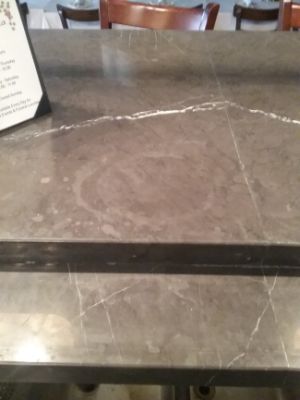
Excuse Me! Can You Please Use a Coaster?
You are invited to dinner at a neighbors house. Upon entering the residence, you are shown downstairs where the other guests have gathered. They all are sitting at a beautiful black marble bar area. You think to yourself that the simple elegance of the stone is incredible, and for a second imagine how it would look in your own home. After being served your drink and taking a quick sip, you carefully set it on the bar. That’s when abruptly you hear it. A voice from the other side of the room. It’s your neighbor…
“Excuse me! Can you please use a Coaster?!?” (Or, in the case of a hotel lobby floor – A carpet runner?!?)
Startled, you quickly pick up your drink. As you do, you notice something. Across the entire length of the bar are ring shaped stains and etches. While some parts of the bar show a beautiful shine, other parts are quite dull.
You wonder to yourself “How could this happen? Marble is a natural stone. Shouldn’t it be tough and hard? Could a simple drink ruin it?”
The reason for the etching has to do with what marble is made of. All the marble we see today has gone thru incredible experiences in its history. Experiences a human being cannot fathom. It has tolerated millions of years of immense pressure from the earth and it’s oceans. What formed was a natural material called calcium carbonate.
Calcium Carbonate is the most widely used mineral known to man, and is found throughout the world. Without knowing it, you have seen it throughout you life, from the chalk your teachers used in gradeschool, to the calcium supplement you take, to the paper that’s is your printer. All are composed of this mineral.
When chalk or limestone are put under intense heat and pressure, the calcium carbonate under goes a process called recrystalization, and voila!…Marble is formed.
While it is very unique and beautiful, there is a problem. It is highly reactive to acids. Unfortunately, most of what we drink everyday is acidic. Coffee, beer, wine, tea, orange juice, lemonade are all acidic drinks. If spilt on a newly installed marble, etching and dullness will appear.
So, after picking up your drink, what is a good response to your neighbors request?
“Yes, I can use a coaster. However, coasters can be unreliable as a protectant against spills and stains, as you can see. To protect your marble, have it sealed when installed, clean up spills immediately (blot, don’t wipe or swipe), when cleaning use a neutral ph cleaner, do not leave acidic liquids on the marble, and get familiar with a local professional who can help with any etching and dulling areas.”
Your neighborhood and your marble will be thankful.

